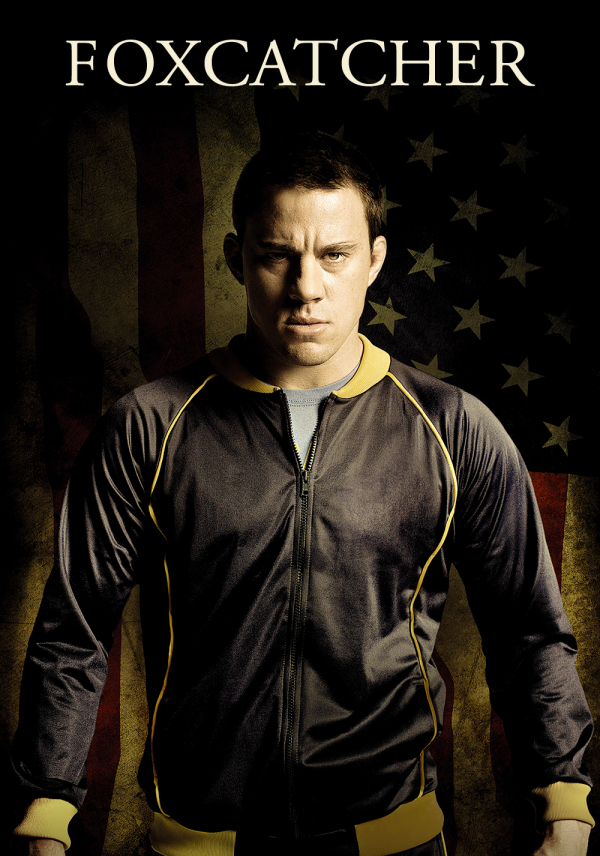FOXCATCHER (2014, directed by Bennett Miller, 130 minutes, U.S.)
BY DAN BUSKIRK It’s hard to live in the state of Delaware and not say the name “DuPont” every day or two. Highways, hospitals, chemical plants and state parks all carry the name. In fact, the DuPonts own their home state in a way that few old money families can claim. Residents of Delaware have made peace living in the shadow of these modern day Dukes and Duchesses but there was something unnerving to discover in 1986 that the DuPont name had been affixed to homicide. The news broke that John E. DuPont, a high-profile direct heir to the family fortune, had murdered an Olympic gold medalist wrestler in some sordid little world that had been conjured on the family’s 800-acre Foxcatcher Farms estate in Newtown Square. The incident and its high-profile news coverage raised the question: what if those wise elders who invisibly run our society are actually bat-shit crazy? You don’t have to be a local to be morbidly fascinated by director Bennett Miller’s telling of the story in his new film Foxcatcher, but for audiences in the Delaware Valley, DuPont’s story takes on an extra dimension of fascination.
Miller’s re-telling of the event is heavy on the psychological shading and involves a quartet of finely detailed performances of the highest caliber. The performances are only made fuller by allowing three of the four actors to fully embody their characters on the wrestling mat (Ms. Redgrave is forced to find her character without the aid of any grappling moves). Channing Tatum [pictured, above] is Mark Schultz, a somewhat dull-witted gold medalist who despite his success is still living in the shadow of his gold medalist older brother/father figure Dave Schultz (Mark Ruffalo). Mark is living a bare-bones ramen-fueled existence while training for the 1988 Olympics when he is recruited by John E. DuPont (an unrecognizable Steve Carell) to come live on his estate with other wrestlers in a state-of-the-art training facility. It seems DuPont is an ardent amateur wrestling enthusiast and he is willing to put his fortune to good use to train an Olympic wrestling team, Team Foxcatcher. From our first meeting with John at the Foxcatcher estate we can see something is not-quite-right about the dull-natured DuPont, and when we meet his dismissive mother (Vanessa Redgrave in full bloom) we get an idea of what Norman Bates and his mom might be like if they lived in the lap of luxury instead of a broken down old motel. As DuPont stands over the squirming bodies like a revolutionary war general the repressed sexual desire radiates from his intense interest.
The story is a slow waltz toward awful inevitability with the sociopathic DuPont lurching awkwardly towards friendship and manipulation, and with the bewildered Mark stumbling without his older brother Dave to supply him focus. The wound-tight zillionaire without a friend in the world and the semi-addled jock who is apparently trading late night on-the-mat butt-sex for room and board make for an unsavory pair that are hard to cozy up to, yet Miller brings a dare-I-say-it Kubrick-like control to the many rich details that keep this slow-building drama relentlessly mesmerizing.
Carell’s work should be pointed out for special consideration. Often comic actors have an over-developed sense of timing that betrays their humor background as they deliver dialogue. Carell’s DuPont however is immune to the beat; his halting, semi-preposterous self-inflating patter (“You can call me Eagle”) is delivered in the least charismatic manner imaginable. His conversations with Mark, an athlete who you might guess has taken too many shots to the head, are like overhearing inane cocktail party patter that one would back away from at first chance. Channing Tatum imbues his character with a needy vulnerability that makes his deepening father-son relationship with the drunken and abusive DuPont all the more tragic.
At the heart of the film are two damaged men, one a man of great physical power but little emotional strength and another, a man who surrounds himself with physical strength yet whose failures as a human being are well-cloaked by the inexhaustible wealth at his command. Carrell’s DuPont never seems crazier than when he’s drunk and snorting snootfuls of cocaine in his private helicopter with Mark. They’re being flown to some prestigious event where DuPont is being honored. At his arrival, the powerful men all make polite talk although DuPont is high as a kite and boastfully strutting around, showing off his gold medalist friend. DuPont’s wealth isolates him from anyone’s judgment (except that of his withholding mother) and as his behavior gets crazier and crazier his privilege prevents him from getting the help he needs.
Foxcatcher’s perverse mix of moods, the stately early American design offset by the primal, homo-erotic charge of men grasping and groaning on the floor, seems to underline that DuPont’s life is a paradox that can’t be reconciled. Redgrave’s matron DuPont says she doesn’t like to see her son John around the wrestlers because the sport is “low.” DuPont’s unfathomable descent into murder becomes explicable when watching this mother and son interact; a sad cry for a mother’s love, a need for her to forgive the unforgivable. Like Norman Bates’ mother, she was dead at the time of the murder anyway, but with Foxcatcher the ghosts of the DuPont legacy still haunt us.

